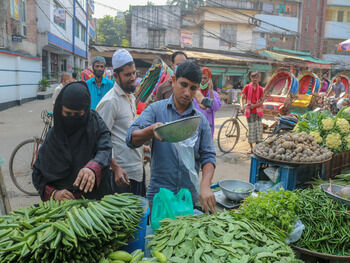Research News Last updated 18 December 2024

A £2.6m project that will transform the lives of farmers in rural Bangladesh by advancing clean energy and sustainable agriculture is being led by a team of researchers from Birmingham City University (BCU).
Funding from the UK Research and Innovation’s prestigious Ayrton Fund Challenge, which awarded grants to just 13 organisations in the UK, has helped bring the ambitious initiative to life.
“I’m thrilled to see five years of collaboration with our international partners evolve into this exciting project,” said Dr Lynsey Melville, Professor of Environmental Engineering at BCU: “This project envisions a future where Bangladesh’s rural communities thrive on sustainable agricultural practices powered by clean energy technologies.”
One of the project’s goals is to increase the shelf life of perishable fruits and vegetables, which will empower local farming communities – in particular women, who are largely responsible for post-harvest activities – to create new micro-businesses to boost their local economy.
In Bangladesh, more than 60% of the population rely on agriculture for income, yet most of the country’s 1.6 million irrigation pumps still run on diesel fuel. This makes them a big contributor to the country’s carbon emissions and air pollution.
The project seeks to drive a large-scale clean energy transition in rural communities that will cut emissions and utilise energy more efficiently.
It aligns with BCU’s new Strategy 2030 ‘Rooted in Birmingham, Reaching Beyond’, which aims to create knowledge that has a positive impact for people, communities, and the planet.
Professor Hanifa Shah, Pro Vice-Chancellor STEAM and Executive Dean of the Faculty of Computing, Engineering and the Built Environment at BCU, said:
“This project is a shining example of how CEBE’s expertise in clean energy technologies, sustainable systems and interdisciplinary STEAM innovation aligns with BCU’s strategic vision of creating knowledge for good. By integrating advanced energy systems with sustainable agricultural practices, we’re addressing global challenges while empowering local communities. This initiative embodies our commitment to driving impactful change that fosters environmental resilience, economic prosperity and social equity—core values of our faculty and BCU’s Strategy 2030.”
Professor Melville will lead an interdisciplinary project team from the faculties of Business, Law and Social Sciences (BLSS), and Computing Engineering, and Built Environment (CEBE).
They will collaborate with partners at Bangladesh Agricultural University (BAU) and leading Bangladeshi NGOs – Bright Green Energy Foundation and Water and Sanitation for Urban Poor.
The project aims to develop smart energy systems that harness excess electricity generated by Solar Irrigation Pumps (SIPs) and channel it towards local agricultural needs, such as sustainable cooling, post-harvest management, and food processing.
Researchers will work with farmers and cooperatives to establish five pilot sites across Bangladesh. They are designed to demonstrate sustainable pathways to clean energy adoption, food security, and economic growth.
“By using innovative tools, we will develop inclusive and sustainable solutions that contribute to a greener and more resilient future for rural communities across Bangladesh,” said Co-Investigator Professor Cham Athwal, who’s work on SIPs in India has been pivotal to this project.
The research aligns with the broader aims of the Ayrton Fund, a UK government-backed initiative committing up to £1 billion to accelerate the clean energy transition in developing countries through innovative clean energy solutions.